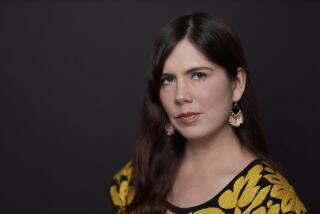Review: S.M. Hulse stakes out a new frontier with ‘Eden Mine’
Hulse’s second novel imagines a family torn between love and domestic terrorism.
- Share via
Across two novels, S.M. Hulse has been inventing a new version of the western. Part of her mission involves updating the genre’s content, thrusting its violent themes into the present day: The plot of her 2015 debut, “Black River,” turns on a prison riot in Montana. Yet she delivers this tough material with unusual gentleness. Her style doesn’t soften her subject matter, exactly, but gives it a slower, more contemplative feel — think of Kent Haruf or latter-day Thomas McGuane. She uses the same strategy in her second novel, “Eden Mine,” which traces the aftermath of a bomb explosion in a Montana courthouse. The grace with which Hulse depicts it is enchanting, if a little bemusing: Should a story about domestic terrorism feel so cozy?
The source of that mood is the novel’s narrator, Jo, who as the story opens has learned that her brother, Samuel, is responsible for that courthouse bomb. Samuel planted it as a protest against the authorities who are eminent-domaining the family’s 40-acre homestead to build a new highway. His intentions were violent but not murderous — the explosion took place on a Sunday, when the building was empty. But a nearby storefront church was also hit, landing a pastor’s young daughter in critical condition. Samuel is on the lam, leaving Jo, who was shot and rendered paraplegic years earlier, to fend off the ensuing police and media circus on her own.
Jo is a familiar frontier-woman type: flinty, dryly funny, skeptical of authority and determined to be independent. Though she’s saddened by Samuel’s act, she’s moved to soft-pedal his radicalism: “So my brother holds some fringe beliefs. He talks, that’s all. Talks and talks until he loses interest in whatever he’s been talking about and goes in search of something else.” He was a Nazi for a time but gave it up, Jo explains; he grouses about the Zionist Occupied Government but doesn’t really believe in it. So he’s ... only a little terroristic? Through Jo, Hulse is navigating a tricky path, engaging with the evil of Samuel’s actions while persuading the reader to keep a measure of compassion for him as Jo’s lifelong protector.
Hulse squares that circle by keeping Samuel offstage for most of the novel; though the story is pocked with interludes written from Samuel’s point of view, they can easily be interpreted as projections of Jo’s frustration and confusion. Which works to the extent that Jo is fine company during the month covered by the novel. She banters with her boss at the gas station where she works and with the good-natured local sheriff who knows her family lore: her father’s death in a nearby mine, her mother’s murder by a violent boyfriend, Samuel’s separatist history. And she’s righteously impatient with Devin, the FBI agent pressing Jo for details about Samuel’s whereabouts. “I don’t trust Devin, or the FBI, and that doesn’t make me wrong or deluded or hostile; it makes me right,” she explains.
Mostly, though, Jo tries to keep to herself, clearing her head by riding her mule to the nearby foothills and the closed mines, which bear the biblical names Eden and Gethsemane. She also paints landscapes that Samuel dismisses as “the Disneyland version of Montana.” But she can keep the courthouse crisis at arm’s length for only so long: When a storm knocks down a tree that cuts off her wheelchair’s path home, she’s forced to seek help from Asa, the pastor whose daughter was wounded at the church. Their interaction is a plot contrivance — where’s a good-natured, bantering sheriff when you need one? — but it gives Hulse an opportunity to thoughtfully explore the themes of faith and forgiveness at the heart of the novel.
Hulse means to ask: How much responsibility do we have for the harm that’s caused by those closest to us? Asa’s faith was animated by a moment when his father accidentally struck a child on a bicycle while driving; as his father went to get help, Asa performed a laying-on of hands that he’s sure healed the child. But his inability to perform the same magic on his daughter is eroding his faith.
Jo is grateful for Samuel’s presence, as he helped her survive the gunshot wound that cost her the use of her legs (an aftereffect of family drama years earlier), but her compassion was a weak counterweight to Samuel’s fury and eventual radicalism. “Some part of you, however deep down, is at least a little glad I did what I did,” reads one of Samuel’s missives — or a missive Jo imagines him writing. She’s heartbroken over Asa’s daughter but can’t reject her brother either.
Jo attempts to paint her way out of this bind: Mindful of Samuel’s Disneyland comment, she literally works the land into her work, adding ash and dirt and toxic water into her palette. The imagery makes for Hulse’s loveliest writing: “I add a tiny amount of powdered silver ore our father brought out of Gethsemane for Samuel, mix it all together with a few drops of water from the creek. The result is a thimbleful of smooth color that is nearly — but not quite — black, like the night sky seconds after the darkest point of night.”
This is a funny way to write about domestic terrorism — to dab in some faith healing and plein-air painting. The animating force of a western is the urge to right a wrong — in the case of “Black River,” a prison guard’s confrontation with the inmate who grievously wounded him years before. “Eden Mine” at times feels disorienting because Hulse is striving to preserve the intimacy of western tropes (protecting the homestead, keeping the family whole) while stretching its canvas. Big Sky Country awkwardly expands to include the kind of violence that makes national news, with a hero whose brother is hard to sympathize with.
But if “Eden Mine” is a peculiar western, it’s a welcome entry in the genre of terror-themed fiction, which since 9/11 has been prone to either Don DeLillo-esque geopolitical pronunciamentos or unsatisfying mind-of-a terrorist psychological studies. Hulse simply concedes that the motivations of a terrorist are unknowable; she wants to understand the blast radius, not the bomb.
Hulse’s eagerness to do that excavation alleviates some of the more cloying elements of the story: Asa’s tested faith, the noisily symbolic names of the mines, sources of original sin and punishment. And it pays off in the end: In the climactic closing scenes, Hulse delivers a thrillerish exploration of the dueling urges to save or punish in the face of violence. Our salvation lies in our ability to adapt, Hulse suggests, to extricate ourselves from the ruts of anger and ideology. “Every day things are the same, they’re worse,” Asa tells Jo at one point, speaking about his daughter’s condition, but also more broadly. “Every day things don’t change, they do.”
Athitakis is a reviewer in Phoenix.
S. M. Hulse
Farrar, Straus and Giroux: 272 pages; $27
More to Read
Sign up for our Book Club newsletter
Get the latest news, events and more from the Los Angeles Times Book Club, and help us get L.A. reading and talking.
You may occasionally receive promotional content from the Los Angeles Times.








